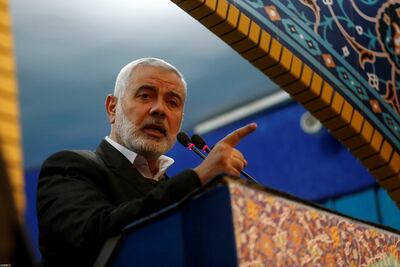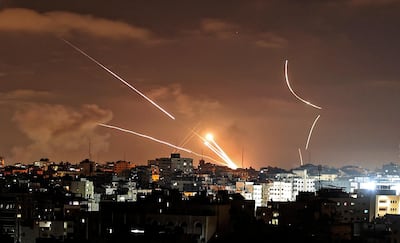Israel's Prime Minister Benjamin Netanyahu vowed to hit back hard against Hamas, the Palestinian militant group in control of the Gaza Strip that launched more than 1,000 rockets at Israel in recent days.
In response to the barrage of rockets from the coastal enclave, Israel's air force pummelled Gaza with hundreds of air strikes, killing at least 83 people, 17 of them children.
The Israeli military targeted high-ranking Hamas leaders as it sought to make good on Mr Netanyahu's recent promise to "hit them like they've never dreamt possible".
The fighters of Hamas's armed wing are known for their black balaclavas and green headbands.
As Israel's attacks continue, the bodies of fighters, clad in that same black and green, are being laid to rest.
To the Israeli government, they are public enemy No1, but what does the militant group stand for? And how did it come to dominate Gaza?
Fundamental roots
Hamas's roots lie in hardline ideas and the international Muslim Brotherhood – its full name is the Islamic Resistance Movement.
The group portrays itself as the defender of Jerusalem's Al Aqsa Mosque and says it was compelled to launch the latest attacks after Israeli police stormed the holy site this week, after peaceful protests by Palestinians in Jerusalem.
The group's founding charter indicated an aim to see an Islamic state formed across historic Palestine, although since 1994 its leaders have said the group would be open to a truce with Israel based on the borders drawn up after the 1967 war.
From 1993 to 2008, Hamas sent suicide bombers to attack civilian targets in Israel – a tactic with which it became synonymous.
Hamas is listed as a terrorist group by the US, EU, Israel, Japan and Canada. The group's military arm, the Ezzedine Al Qassam Brigades (or Qassam Brigades for short), are listed as terrorists by Australia, New Zealand, Paraguay and the UK.
As well as possible war crimes, which the International Criminal Court is planning to investigate, Hamas is regularly accused of human rights breaches and running an autocratic state in the Gaza Strip.
The home of the group's political leader, Ismael Haniyah, was destroyed on Thursday in a targeted Israeli strike. But he was not at home, having lived in exile in Doha since 2019.
In recent years, the group has received financial support from Iran and Qatar.
Rise to control the strip
In 2006, the group won the most seats in elections for the Palestinian Parliament, raising the question of whether it would renounce violence and try to reform as a purely political body.
However, the election sparked a brief civil war with rival Palestinian party Fatah – led by Palestinian President Mahmoud Abbas.
In the battle Hamas took control of the Gaza Strip, with Fatah expelled and largely confined to the West Bank. The schism continues to this day despite attempts to mediate a resumption of ties.
Since then, Gaza has been a Hamas fiefdom and the group’s launch pad for frequent attacks on Israel, which imposed a blockade.
This shuts the borders to those without permits for travel, which are difficult to obtain, stops the import of many products and sets limits on things such as concrete, that Israel says Hamas uses to build underground tunnels.
Rights groups say the policy has led to a dire humanitarian situation, mass unemployment and poverty, poor services and have likened Gaza to a mass open-air prison.
The Hamas rocket attacks often meet fierce Israeli retaliation, and the violence tipped into a full-blown war on three occasions – most recently in 2014.
Rocket arsenal
Despite the blockade on Gaza, Hamas has managed to build up a vast arsenal of short-range rockets and missiles. It also has longer-range missiles, capable of striking Israel's northern cities more than 200 kilometres away.
Human Rights Watch said the group's regular rocket barrages towards Israel constitute war crimes and "are inherently indiscriminate and endanger the lives, homes, and properties of tens of thousands of Israeli civilians".
Hamas is deeply entrenched in Gazan society.
The group is often criticised for launching and storing weapons in residential areas, and makes use of a vast network of tunnels and underground bunkers that offer protection from Israeli jets above.
Palestinian elections
Despite all of the concerns, Hamas was widely expected to do well at Palestinian elections scheduled this month, something that may have allowed the group to expand its reach into the West Bank at the expense of Mr Abbas.
When the vote was postponed indefinitely on April 29, Hamas criticised the delay as a coup.
For some Palestinians, these elections had offered the prospect of an easing of Israel’s blockade on Gaza, and perhaps even the healing of the inter-Palestinian splits.
These are hopes that vanished with the election delay, hopes that seem even more remote now with the recent outbreak of violence.



















